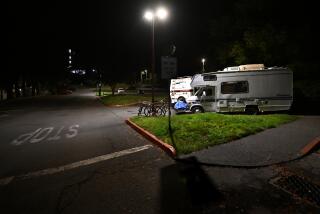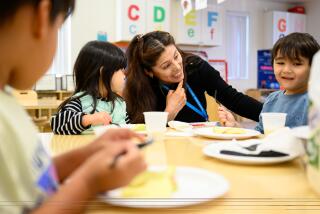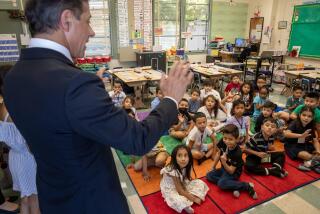Readers React: What teachers have long known: It’s up to society to end childhood poverty, not schools
To the editor: As a retired elementary school teacher in Moorpark, I can attest to the accuracy of the information contained in Steve Lopez’s four-part series on poverty and education.
Although the schools where I taught had fewer students living in poverty, I can tell you that any student with absent parents, or who lives with uncertainty about where he will sleep at night or when he will next eat, has a harder time learning. These students are much more anxious about survival than they are interested in the lessons that I prepared.
Just as education professor Stephen Krashen stated in a Nov. 22 letter to the editor, “even major improvements in teaching will not overcome the effects of poverty, unquestionably the strongest factor in school achievement.”
The public needs to stop blaming teachers; there are no “failing schools.” When the social, economic and emotional needs of students are met, they will succeed academically.
Nancy Cooper, Moorpark
..
To the editor: Lopez’s brilliant and heartbreaking series should be required reading for every politician and school official in California.
I am a product of the Los Angeles Unified School District and the state’s public university system. My mother was an LAUSD elementary school teacher, teaching in Pacoima and San Fernando, until she received her masters in counseling and went on to become an elementary school counselor in the district’s neediest areas.
For her, each day was an uphill battle. Sometimes she had to visit the garages were some families lived. But she came home each night knowing she was making a difference in the lives of students.
My mother was grateful she had a principal who understood how important counselors were to children’s well-being and was willing to spend some of her budget on a counselor and a psychiatric social worker. One step LAUSD could take would be to make sure schools have this type of support for students.
Holly Cantos, Los Angeles
..
These students are much more anxious about survival than they are interested in the lessons that I prepared.
— Nancy Cooper, Moorpark
To the editor: Thank you for putting a spotlight on child homelessness. This issue should be a concern for not just every Angeleno, but our entire country. If we truly call ourselves a community, we must act like it and take care of one another, especially those in need.
A car seat. A motel room. A garage space. A shelter bed. These are not the homes of our own children, and yet for so many of America’s children these spaces are their home. The United States is not an impoverished, developing country with sparse resources.
Look around. You only need to drive through the leafy neighborhoods of West L.A. to see this country’s wealth.
Just like every child has the right to an education, we should also ensure that every child in America has the right to a home.
Joel John Roberts, Los Angeles
The writer is chief executive of the nonprofit People Assisting the Homeless.
..
To the editor: I have long admired Lopez’s brilliant, insightful and hard-hitting work. His series on childhood poverty in Los Angeles was particularly heart-wrenching.
Having been a biology teacher for 50 years, and now currently serving as a volunteer math tutor in a mostly Latino local school, I can see what a difference a real bed in a home means to a child’s well-being and future potential. I once had a child tell me that her brother couldn’t help her learn her “times” tables because he was on a “special vacation” and she didn’t know where her dad was.
I’ll end with two questions: First, what about all the California lottery money? Second, would Lopez consider running for state superintendent of public instruction? He’d have my vote.
Jerry Lasnik, Thousand Oaks
..
To the editor: Reading Lopez’s series brought tears to my eyes, because I have a similar story.
My father left our family when I was 4 years old. It was the early 1950s, and my mother had to raise her three children alone.
I was emotionally scarred from what I suspect was a terrible experience at school. At the age of 10 I was 50 pounds overweight and could barely read, and I was the target of cruel bullying not only from classmates, but also my brother. My mother was never home because she was out making a living.
Now, many decades later, I can look back on a life in which I was able to start two successful businesses and live in homes that I owned. I explain to all my conservative friends that they simply do not know what it’s like to have nothing, a feeling I can never forget.
We need a strong safety net to help people out of poverty. We are only kidding ourselves if we don’t have one.
Ed Sinderman, Laguna Woods
..
To the editor: In the same week scientists landed another robot safely on Mars, we read Lopez’s series on children living in garages and moving from motel to motel room while trying to do well at school.
Don’t get me wrong, I love “Star Trek” as much as anyone. But why spend billions — yes, billions — on exploring extraterrestrial geology, while Earth’s children struggle for the basics today? Where are our priorities?
Scott K. Flaschner, Simi Valley
Follow the Opinion section on Twitter @latimesopinion and Facebook
More to Read
A cure for the common opinion
Get thought-provoking perspectives with our weekly newsletter.
You may occasionally receive promotional content from the Los Angeles Times.






